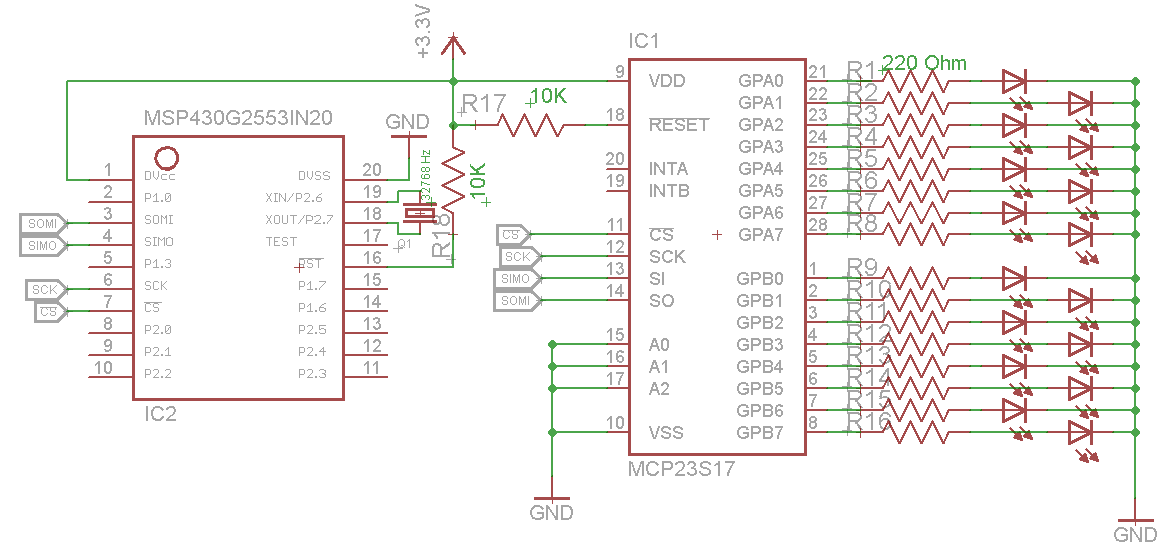Other Parts Discussed in Thread: MSP430G2553
Hello!
I'm having difficulties communicating with MCP23S17 I/O expander using SPI. I'm using IAR and Launchpad Rev.1.5 with MSP430G2553. Thing is, that attached leds don't even turn on. It even seems like master doesn't provide clock pulses or i'm missing something important. Maybe someone had experience with this I/O expander and with experienced eye could look what i'm missing. Unfortunately i don't have oscilloscope to look at outputs..
#include "msp430g2553.h"
// *** Global variables *** //
#define _CS BIT5 //Set P1.3 as Chip Select
// *** Function prototypes *** //
void ConfigureSPI (void); //Set up SPI communication
int main (void)
{
// *** Set-up watchdogtimer and clock system *** //
WDTCTL = WDTPW + WDTHOLD; //Stop watchdog timer
DCOCTL = 0; //Select lovest DCOx and MODx settings
BCSCTL1 = CALBC1_1MHZ; //Set range
DCOCTL = CALDCO_1MHZ; //Set DCO step + modulation
// *** Set up GPIO *** //
P1OUT = 0x33; //Turn pins LOW except P1.5(_CS) & P1.0
P1DIR = 0xFD; //Set Port 1 as OUTPUTS exc. P1.1
ConfigureSPI(); //Configure MSP for SPI
while (1)
{
//Set A port to OUTPUTS
P1OUT &= ~_CS; //Set _CS LOW
UCA0TXBUF = 0x40; //Send Control Byte
while (!(IFG2 & UCA0TXIFG)); //USCI_A0 TX buffer ready?
UCA0TXBUF = 0x00; //Access to IODIRA
while (!(IFG2 & UCA0TXIFG)); //USCI_A0 TX buffer ready?
UCA0TXBUF = 0x00; //Set to OUTPUTS
while (!(IFG2 & UCA0RXIFG)); //USCI_A0 TX buffer ready?
P1OUT |= _CS; //Set _CS HIGH
__delay_cycles(10000); //Simple delay
//Send data to GPIOA address
P1OUT &= ~_CS; //Set _CS LOW
UCA0TXBUF = 0x40; //Send Control Byte
while (!(IFG2 & UCA0TXIFG)); //USCI_A0 TX buffer ready?
UCA0TXBUF = 0x09; //Access to GPIOA
while (!(IFG2 & UCA0TXIFG)); //USCI_A0 TX buffer ready?
UCA0TXBUF = 0xFE; //Turn ON OUTPUTS
while (!(IFG2 & UCA0RXIFG)); //USCI_A0 TX buffer ready?
P1OUT |= _CS; //Set _CS HIGH
__delay_cycles(10000); //Simple delay
}
}
//Sub-programm for SPI setup
void ConfigureSPI(void)
{
P1SEL |= BIT1 + BIT2 + BIT4; //Set up pins
P1SEL2 |= BIT1 + BIT2 + BIT4; //Set up pins
UCA0CTL1 = UCSWRST;
UCA0CTL0 |= UCMSB + UCMST + UCSYNC; //MSB first, Master mode, Synchronous mode (3-wire)
UCA0CTL1 |= UCSSEL1; //SMCLK
UCA0CTL1 &= ~UCSWRST; //Release USCI for operation
}
Simple schematic:


